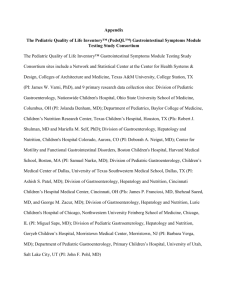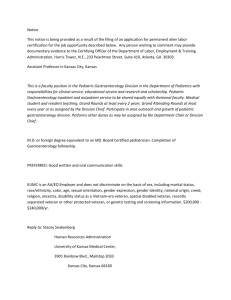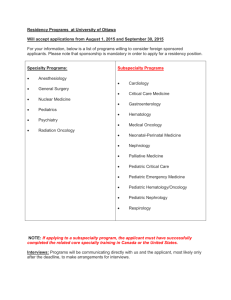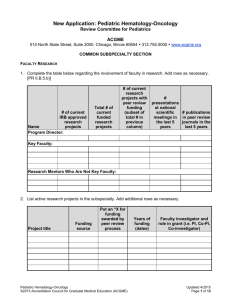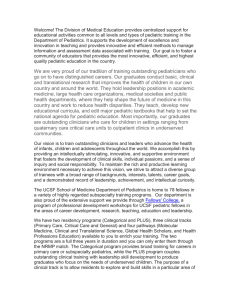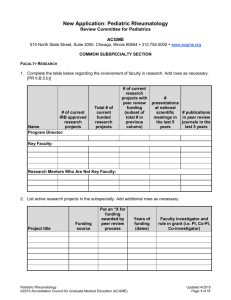Pediatric Gastroenterology
advertisement
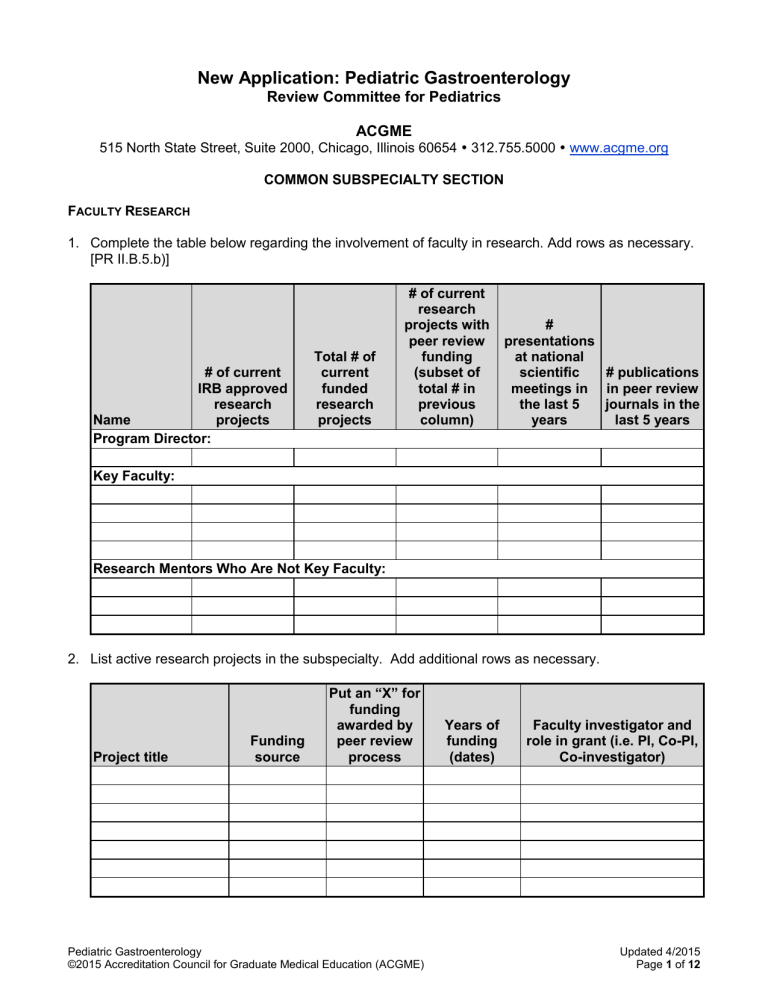
New Application: Pediatric Gastroenterology Review Committee for Pediatrics ACGME 515 North State Street, Suite 2000, Chicago, Illinois 60654 312.755.5000 www.acgme.org COMMON SUBSPECIALTY SECTION FACULTY RESEARCH 1. Complete the table below regarding the involvement of faculty in research. Add rows as necessary. [PR II.B.5.b)] # of current IRB approved research Name projects Program Director: Total # of current funded research projects # of current research projects with peer review funding (subset of total # in previous column) # presentations at national scientific # publications meetings in in peer review the last 5 journals in the years last 5 years Key Faculty: Research Mentors Who Are Not Key Faculty: 2. List active research projects in the subspecialty. Add additional rows as necessary. Project title Funding source Put an “X” for funding awarded by peer review process Pediatric Gastroenterology ©2015 Accreditation Council for Graduate Medical Education (ACGME) Years of funding (dates) Faculty investigator and role in grant (i.e. PI, Co-PI, Co-investigator) Updated 4/2015 Page 1 of 12 RESEARCH RESOURCES 1. Does the program provide research laboratory space and equipment? (if appropriate) [PR II.D.] .................................................................................................................................... ☐ YES ☐ NO 2. Does the program provide financial support for research? ........................................... ☐ YES ☐ NO 3. Does the program provide computer and statistical consultation services? .................. ☐ YES ☐ NO PROGRAM CURRICULUM Goals and Objectives Place an ‘X” in the box before the applicable response. [PR IV.A.2.] Are there goals and objectives for all training ☐ YES ☐ NO experiences? Are they rotation and level specific? ☐ YES ☐ NO How are they distributed? ☐ Hard Copy ☐ Electronic or web-based If not web-based, when are they distributed to ☐ Prior to Each Rotation ☐ Annually fellows? ☐ Once in Handbook ☐ Other If not web-based, when are they distributed to ☐ Prior to Each Rotation faculty? ☐ Annually ☐ Other If web-based, do you send out reminders to access ☐ YES ☐ NO them? If yes, when do you send them? Click here to enter text. Collaboration between Programs Are there meetings among the core Program Director and subspecialty Program Directors? How often do these meetings occur? Who is typically involved in these meetings? (check all that apply) ☐ YES ☐ NO Click here to enter text. ☐ Core program director ☐ Subspecialty program director for this specialty ☐ Program directors from other subspecialties General Subspecialty Curriculum Topic e.g., Biostatistics Basic science as related to the Participants (place and X in the appropriate column) Where Taught in Number of Fellows in Curriculum? Structured this All Residents & (Name should Teaching Hours Discipline Subspecialty Subspecialty match name in Dedicated to Will Fellows Fellows conference list) Topic Area? Attend Attend Attend Research Course 14 X Click here to # ☐ ☐ ☐ enter text. Pediatric Gastroenterology ©2015 Accreditation Council for Graduate Medical Education (ACGME) Updated 4/2015 Page 2 of 12 Participants (place and X in the appropriate column) Where Taught in Number of Fellows in Curriculum? Structured this All Residents & (Name should Teaching Hours Discipline Subspecialty Subspecialty match name in Dedicated to Will Fellows Fellows conference list) Topic Area? Attend Attend Attend Topic application in clinical subspecialty practice Clinical subspecialty Click here to # ☐ ☐ ☐ content enter text. For the topics below, if the topic is not appropriate for your discipline (i.e., lab research for fellows in developmental and behavioral pediatrics), enter N/A into column 1. Biostatistics Click here to # ☐ ☐ ☐ enter text. Lab research Click here to # ☐ ☐ ☐ methodology (if enter text. appropriate) Clinical research Click here to # ☐ ☐ ☐ methodology enter text. Study design Click here to # ☐ ☐ ☐ enter text. Grant preparation Click here to # ☐ ☐ ☐ enter text. Preparation of Click here to # ☐ ☐ ☐ protocols for enter text. institutional review board Principles of evidenceClick here to # ☐ ☐ ☐ based medicine/ enter text. Critical literature review Quality Improvement Click here to # ☐ ☐ ☐ enter text. Teaching skills Click here to # ☐ ☐ ☐ enter text. Professionalism/Ethics Click here to # ☐ ☐ ☐ enter text. Cultural Diversity Click here to # ☐ ☐ ☐ enter text. Systems-based Click here to # ☐ ☐ ☐ practice (economics of enter text. healthcare, practice management, clinical outcomes, etc.) Conferences 1. List regular subspecialty and interdepartmental conferences, rounds, etc., that are a part of the subspecialty training program. Identify the "SITE" by using the corresponding number as appears Pediatric Gastroenterology ©2015 Accreditation Council for Graduate Medical Education (ACGME) Updated 4/2015 Page 3 of 12 on the first and second pages of this form. Indicate the frequency, e.g., weekly, monthly, etc., and whether conference attendance is required (R) or optional (0). List the planned role of the fellow in this activity (e.g., conducts conference, presents case and participates in discussion, case presentation only, participation limited to Q&A component, etc.). Add rows as necessary. Conference Site # Frequency R/O Role of the Fellow 2. Describe the mechanism that will be used to ensure fellow attendance at required conferences. State the degree to which faculty attendance is expected, and how this will be monitored. Limit the response to 50 words Click here to enter text. Scholarship Oversight Committee 1. Will there be a scholarship oversight committee for every fellow? ................................ ☐ YES ☐ NO 2. How often will the committee meet with the fellow? ................................................... # times per year Fellow Research Activities 1. Describe how the program will ensure a meaningful supervised research experience for the fellows, beginning in their first year and extending throughout their training. Click here to enter text. 2. If faculty outside the division will be actively involved in mentoring the fellows, identify the mentors and describe how liaisons will be created between these mentors and the fellows that allows for meaningful accomplishment of research. Click here to enter text. Pediatric Gastroenterology ©2015 Accreditation Council for Graduate Medical Education (ACGME) Updated 4/2015 Page 4 of 12 SPECIALTY-SPECIFIC SECTION PROGRAM PERSONNEL AND RESOURCES Other Professional Personnel 1. Indicate with a check mark the personnel who will interact regularly with fellows at each participating site. [PR VII.B.1.c)] Team Members Physical Therapy Occupational Therapy Social Work Nutrition Feeding Therapy Site #1 ☐ ☐ ☐ ☐ ☐ Site #2 ☐ ☐ ☐ ☐ ☐ Site #3 ☐ ☐ ☐ ☐ ☐ 2. For categories of personnel that are unavailable, describe how that function will be addressed in the program. Click here to enter text. Outpatient and Inpatient [PR VII.B] 1. Indicate the availability of the following: Facility/Service Space in an ambulatory setting for optimal evaluation and care of patients [PR VII.B.1.a)] An inpatient area with pediatric and related services staffed by pediatric residents and faculty [PR VII.B.1.b)] Support services including: radiology nuclear medicine pathology PICU (indicate total number of beds) [PR VII.B.1.d)] NICU (indicate total number of beds) [PR VII.B.1.e)] Endoscopy facilities [PR VII.B.1.g)] Procedure facility for measuring gastrointestinal motility Site #1 Choose an item. Choose an item. Site #2 Choose an item. Choose an item. Site #3 Choose an item. Choose an item. Choose an item. Choose an item. Choose an item. # Choose an item. Choose an item. Choose an item. # Choose an item. Choose an item. Choose an item. # # # # Choose an item. Choose an item. Choose an item. Choose an item. Choose an item. Choose an item. 2. For every facility/service that is not available at any of the sites, provide an explanation below. Explain how the service is provided for patients. Click here to enter text. Pediatric Gastroenterology ©2015 Accreditation Council for Graduate Medical Education (ACGME) Updated 4/2015 Page 5 of 12 3. In a bulleted format explain how fellows, in caring for patients, will have access to a laboratory that can either perform or assess measures of intestinal absorptive and pancreatic function; nutritional parameters; and specialized serological, parasitological, immunological, metabolic, and toxicological studies applicable to gastrointestinal and hepatobiliary disorders. [PR VII.B.1.f)] Click here to enter text. Patient Data [PR VII.B.2) 1. Provide the following information for the most recent 12-month academic or calendar year. Note the same timeframe should be used throughout the forms. Inclusive dates: FROM: Click here to enter a date. Total number of admissions to the Pediatric Gastroenterology service Number of new patients admitted each year (“new” refers to those who are seen by members of the Gastroenterology service for the first time.) Average length of stay of patients on the pediatric Gastroenterology service Total number of consultations by pediatric Gastroenterologists on other inpatients Number of consultations provided to the NICU Number of consultations provided to the PICU Average daily census of patients on the Pediatric Gastroenterology service, including consultations Number of patients requiring follow-up care by Gastroenterology service as outpatients during 12-month period reported TO: Click here to enter a date. Site #1 Site #2 Site #3 # # # # # # # # # # # # # # # # # # # # # # # # 2. If the ADC on the pediatric gastroenterology service is less than six, explain how fellows have an adequate exposure to inpatients. Click here to enter text. 3. Provide the following information for the most recent 12-month academic or calendar year for each site used to provide a specific required experience, such as transplant, cardiology, intensive care, etc. Duplicate this table as necessary. Note the same timeframe should be used throughout the forms. Inclusive dates: FROM: Click here to enter a date. TO: Click here to enter a date. Site #1 Site #2 Site #3 Name of service: Pediatric Gastroenterology ©2015 Accreditation Council for Graduate Medical Education (ACGME) Updated 4/2015 Page 6 of 12 Total number of fellows and residents on the service Total number of admissions to the service Number of new patients admitted each year (“new” refers to those who are seen by members of the service for the first time.) Average length of stay of patients on the service Average daily census of patients on the service, including consultations EDUCATIONAL PROGRAM [PR VIII.] Ambulatory Pediatric Gastroenterology Experience for All Years of Training Add rows as necessary. Name of Experience Site/Other Setting Identifier Planned Number of Duration of Sessions Experience Per Week (in wks/yr) Per Fellow Estimated Number of New Patients Per Fellow Per Session Estimated Planned Number of Average Return Number Patients Teaching Per Fellow Attendings Per Per Session Session If the experience is in a private office, provide full details, including name and credentials of supervisor, numbers and types of patients, degree of fellow responsibility for their care, frequency of attendance at office, how director will monitor the experience and fellow performance. Click here to enter text. Pediatric Gastroenterology ©2015 Accreditation Council for Graduate Medical Education (ACGME) Updated 4/2015 Page 7 of 12 12-Month Summary: Outpatient Clinics/Inpatient Services 1. During the same 12-month period as used in previous sections, how many pediatric patients with the following gastroenterology problems were: a) seen in the ambulatory settings; b) were admitted to and/or consulted on by the pediatric gastroenterologists at the primary site? Inclusive dates: FROM: Click here to enter a date. TO: Click here to enter a date. Outpatients Gastroenterology Diagnosis/Disorder Growth failure and malnutrition [PR VIII.A.8.a)] Malabsorption/maldigestion [PR VIII.A.8.b)]: celiac disease cystic fibrosis pancreatic insufficiency Gastrointestinal allergy [PR VIII.A.8.c)] Peptic ulcer disease [PR VIII.A.8.d)] Hepatobiliary Disease [PR VIII.A.8.e)]: biliary atresia diseases of the gallbladder fatty liver intrahepatic cholestasis autoimmune liver disease viral hepatitis metabolic liver diseases Liver failure (including evaluation and follow-up care of patient requiring liver transplantation) [PR VIII.A.8.e)] Congenital Digestive tract anomalies (including Hirschsprung’s disease) [PR VIII.A.8.f)] Inflammatory bowel disease [PR VIII.A.8.g)] Functional bowel disorders [PR VIII.A.8.h)] Vomiting (including gastroesophageal reflux) Acute and chronic abdominal pain Acute and chronic diarrhea Constipation Gastrointestinal bleeding Motility disorders Pancreatitis (acute & chronic) [PR VIII.A.8.i)] Gastrointestinal problems in the immunecompromised host [PR VIII.A.8.k)] Transplantation [PR VIII.A.9] Liver Total # of patients # Pediatric Gastroenterology ©2015 Accreditation Council for Graduate Medical Education (ACGME) Inpatients Total # of patients on gastro service Total # of # on gastro patients seen service in consultation # # # # # # # # # # # # # # # # # # # # # # # # # # # # # # # # # # # # # # # # # # # # # # # # # # # # # # # # # # # # # # # # # # # # # # # # # # Updated 4/2015 Page 8 of 12 Outpatients Gastroenterology Diagnosis/Disorder Small Bowel Total # of patients # Inpatients Total # of patients on gastro service Total # of # on gastro patients seen service in consultation # # 2. Describe how fellows will gain knowledge of the methods of initial evaluation and criteria for referral and follow-up care of the patient requiring liver transplantation and those with intestinal failure/requiring small bowel transplantation. [PR VIII.A.9] Click here to enter text. List of Diagnoses List 150 CONSECUTIVE admissions and/or consultations to the gastroenterology service. Identify the time period during which these admissions/consultations occurred. The date range should occur within the same 12-month period used in previous sections. The dates must begin on the date the first patient on the list was admitted and end with the date the 150th patient was admitted (e.g., July 1, 2014 through October 20, 2014). Submit a separate list for each site that provides required rotations. Add additional tables as necessary. Site Name: Give inclusive dates during which these admissions/ consultations occurred: Patient ID Number Age FROM: Click here to enter a date. TO: Click here to enter a date. Number of days in hospital Gastroenterologic diagnosis (may include secondary diagnosis if relevant) Skill Objectives Pediatric Gastroenterology ©2015 Accreditation Council for Graduate Medical Education (ACGME) Updated 4/2015 Page 9 of 12 1. Indicate whether or not the program provides experience in each of the following procedures. Use the same 12-month period as indicated on the previous sections. For procedures not performed at any of the participating sites, provide an explanation. Give inclusive dates during which these admissions/consultations occurred: FROM: Click here to enter a date. # performed on service(s) Diagnostic & Therapeutic Colonoscopy (including biopsy) [PR VIII.A.10.a).(1).(a)] Diagnostic upper endoscopy (including biopsy) [PR VIII.A.10.a).(1).(b)] TO: Click here to enter a date. Site #1 # Site #2 # Site #3 # # # # 2. Provide a description of the method by which fellows will acquire skills and how their competence is ensured for the required procedures listed above Click here to enter text. Core Curriculum Identify the learning activities (clinical experience, conference series, journal club, etc.) and training sites (Site #) which will be used to address the required core knowledge area. Core Knowledge Area Gastrointestinal manometry [PR VIII.A.11.a)] Rectal suction biopsy [PR VIII.A.11.b)] Paracentesis [PR VIII.A.11.c)] Esophageal impedance/pH testing [PR VIII.A.11.d)] Pancreatic function testing [PR VIII.A.11.e)] Breath hydrogen analysis [PR VIII.A.11.f)] Endoscopic placement of feeding tubes (including percutaneous endoscopic gastrostomy placement) [PR VIII.A.11.g)] Videocapsule endoscopy [PR VIII.A.11.h)] Endoscopic retrograde List the Corresponding List the Learning Activities Setting in Which These Used to Address the Core Learning Activities Take Year(s) of Knowledge/Skills Area Place Training Click here to enter text. Click here to enter text. # Click here to enter text. Click here to enter text. # Click here to enter text. Click here to enter text. # Click here to enter text. Click here to enter text. # Click here to enter text. Click here to enter text. # Click here to enter text. Click here to enter text. # Click here to enter text. Click here to enter text. # Click here to enter text. Click here to enter text. # Click here to enter text. Click here to enter text. # Pediatric Gastroenterology ©2015 Accreditation Council for Graduate Medical Education (ACGME) Updated 4/2015 Page 10 of 12 Core Knowledge Area cholangiopancreatography (ERCP) [PR VIII.A.11.i)] Management of gastrointestinal foreign bodies [PR VIII.A.11.j)] Hemostatic techniques for variceal and nonvariceal gastrointestinal bleeding [PR VIII.A.11.k)] Percutaneous liver biopsy [PR VIII.A.11.l)] Training in the evaluation of the psychosocial aspects of chronic gastrointestinal disease as they affect the child [PR VIII.B.1.b)] Competence in counseling chronically ill patients and their families including preventive measures for digestive disease [PR VIII.B.1.b)] List the Corresponding List the Learning Activities Setting in Which These Used to Address the Core Learning Activities Take Year(s) of Knowledge/Skills Area Place Training Click here to enter text. Click here to enter text. # Click here to enter text. Click here to enter text. # Click here to enter text. Click here to enter text. # Click here to enter text. Click here to enter text. # Click here to enter text. Click here to enter text. # Inpatient Experiences What responsibilities will the fellows have for inpatients and how and by whom will they be supervised when assigned to inpatient services? Click here to enter text. Outpatient Experiences 1. Describe the responsibilities that fellows will have for outpatients and how and by whom fellows will be supervised. Click here to enter text. 2. Describe the continuity of care experience fellows will receive during their period of assignment to the outpatient clinic. To what extent will fellows have the opportunity to provide outpatient care for patients whom they treated on the inpatient service? [PR VIII.A.7] Click here to enter text. IF THERE ARE ANY UNIQUE SCENARIOS OCCURRING IN THE PROGRAM THAT DO NOT FIT WITHIN THE CONFINES OF THIS FORM, PLEASE EXPLAIN. Click here to enter text. Pediatric Gastroenterology ©2015 Accreditation Council for Graduate Medical Education (ACGME) Updated 4/2015 Page 11 of 12 Pediatric Gastroenterology ©2015 Accreditation Council for Graduate Medical Education (ACGME) Updated 4/2015 Page 12 of 12

